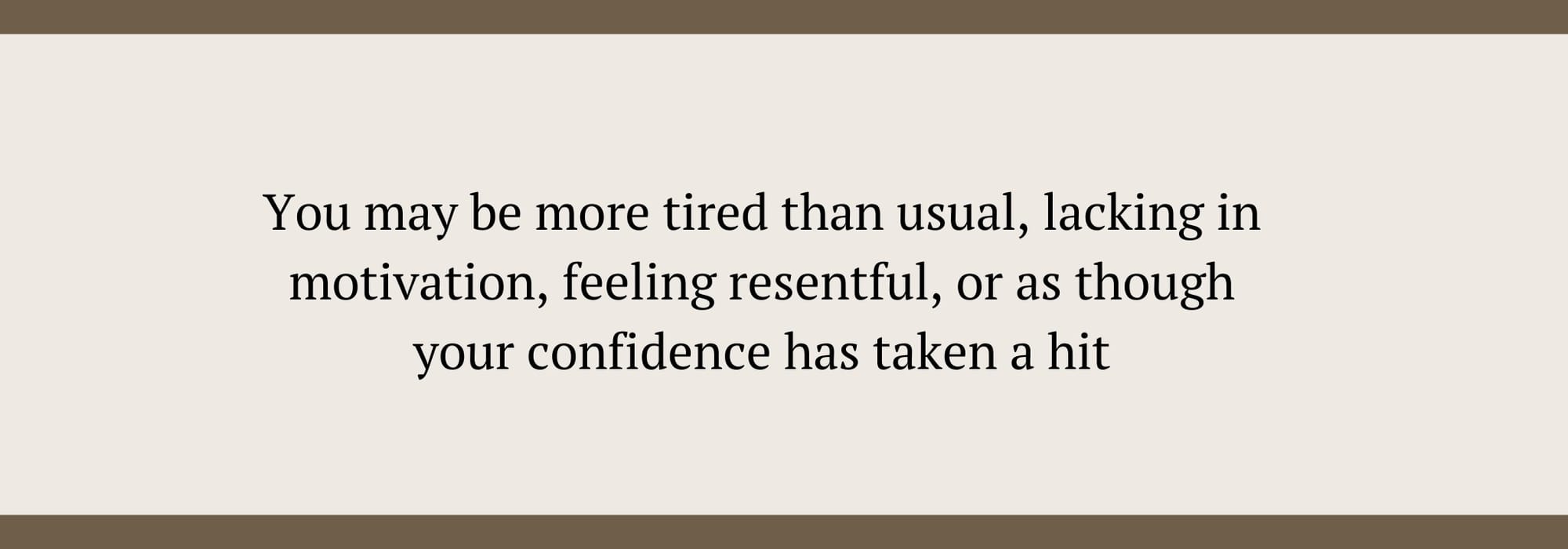Whether it’s bearing the weight of all the emotional labour in a relationship, or tirelessly going above and beyond in your work, feeling like you’re being taken for granted is extremely draining. Here, we’re exploring how to finally begin the conversation to get the acknowledgment you need, but have been missing
You spend hours preparing a gourmet meal for your family, only to be met with grunts and empty plates. You put in extra hours at work to meet a deadline, but your boss praises your colleague who did the bare minimum. These scenarios, while seemingly insignificant, can leave a nagging feeling: you’re not appreciated. But the pain of unappreciation goes far beyond a bruised ego. It can chip away at your self-esteem and damage your relationships.
The sting of unseen efforts
Feeling unappreciated is that underlying sense that your contributions are not acknowledged or valued by others. It can manifest in a variety of ways, from a lack of verbal praise to a complete disregard for your efforts. Whichever form it takes, feeling unappreciated can have a significant negative impact on our emotional wellbeing.
In the workplace, employees who feel unappreciated are twice as likely to quit, according to a study by WorkHuman, while expressing gratitude to our significant others can improve the quality of the relationship. Even friendships need appreciation, with a study published in Emotion in 2011 reporting that those who communicate gratitude to their friends are more likely to work through problems and have a more positive perception of each other person.
“As humans, we all want to be seen, heard, and valued,” says Petra Velzeboer, a psychotherapist, executive coach, and author of Begin With You: Invest in Your Wellbeing & Satisfaction at Work. “When we are putting effort in and it’s never noticed, or worse, we are criticised constantly, our morale dips, we are likely to put less effort in, and consequently feel unfulfilled. This could spiral into doing less of the things that boost our mental health, impacting our overall mood and health.”
Feeling resentment is a normal reaction, but left unchecked it can take its toll, causing conflict, and unnecessary stress. If accompanied by chronic anger, this can trigger the fight-or-flight response, which alters heart rate, blood pressure, and immune function, heightening the risk of depression, heart disease, diabetes, and other health issues.
Feeling underappreciated can also erode your sense of self-worth. You may begin to question your abilities, and wonder if anything you do matters. Not the best headspace for anyone to find themselves in, right?

Reflect on your experience
But, before you start an argument over feeling unappreciated, it’s important to recognise that everyone expresses appreciation in different ways. You may thrive on verbal praise, seeking words of affirmation to feel valued, whereas others appreciate clear actions, such as a pay rise or a bunch of flowers. While you might not be receiving appreciation in your preferred form, it’s worth considering if others show gratitude in ways you haven’t yet recognised.
How to tell when you’re not being appreciated
There are two key areas where unappreciation shows up in life. In relationships, you may feel like you’re constantly taking care of chores, or being the main source of emotional support for others, without getting the same in return. In the workplace, you might work extra hours without being thanked, have your mistakes highlighted without any praise for your wins, or feel like you’re on the sidelines while your peers get promoted.
Unappreciation could be the trigger if you’re not feeling like your usual self. According to hypnotherapist Chloe Brotheridge, coach and expert on high-functioning anxiety, and author of The Anxiety Solution: “You may be more tired than usual, lacking in motivation, feeling resentful, or as though your confidence has taken a hit.”
So, how can you address feeling unappreciated at work and in your relationships?
Plan what you want to say
It may be tempting to sweep negative feelings under the rug, but effective communication can be the bridge to a happier future. Start by writing down how you feel, reminding yourself that your experience is valid, and make a list of the times when you’ve felt unappreciated. Summarise what you want to say in a few sentences, and practise saying it out loud before you address the situation in person.
Talk it out
Being open about how you feel is important, but it’s best to choose your time wisely to keep the discussion as calm as possible. “Choose a good time to talk, letting the person know in advance what you’d like to discuss, and express your feelings calmly and clearly,” Chloe suggests. “Avoid blaming the other person, as this can trigger their defences; instead talk about the facts and how you feel before making a request.”
Don’t enter the conversation with a closed mind, and be prepared to actively listen to them without interrupting. This helps identify any misunderstandings or hidden reasons for the lack of appreciation.
Avoid the blame game
Accusatory statements are likely to cause conflict, so try to talk openly without laying blame. “Use ‘I feel’ statements, rather than ‘you make me feel’, be specific about what actions make you feel unappreciated, and suggest ways they can show appreciation,” says Chloe. “For example, with a partner, you might say, ‘When I cooked a special dinner and you didn’t acknowledge the effort that went in, I felt unappreciated.’ At work, you might say, ‘I worked 10 hours of unpaid overtime to ensure our project was completed, and a colleague took the credit.’”

Work towards solutions
Instead of simply making demands, work together to brainstorm solutions that address your need for appreciation, and value their perspective. This creates a sense of teamwork and increases the chances of finding a mutually beneficial outcome.
In relationships, you could suggest a household chore schedule to ensure a fair division of tasks, ask for your partner’s support in emotionally laborious tasks such as decision-making, meal-planning, and overseeing your child’s homework, or consider setting aside a few minutes at the end of the day to express gratitude for one other.
In the workplace, you could request a meeting to discuss taking on a project that allows for greater recognition of your skills, or suggest performance reviews where your contributions are formally recognised.
Seeking appreciation in the workplace can be challenging. “We might be worried we’ll sound arrogant, but there is an art form that can be practised to have our own contributions noticed,” says Petra Velzeboer. “Start by praising others, and naming what you admire about them – this helps create a culture where it’s more likely to have this feeling reciprocated. Saying things like ‘I’m really proud of how I got to this point’ in a way that’s uplifting and inclusive can also help the energy at work change.”
Feeling unappreciated can be draining, but open communication is the key to addressing this issue. By expressing your needs calmly, and working collaboratively to find solutions, you can take charge of your happiness, and get the recognition you deserve.


Comments